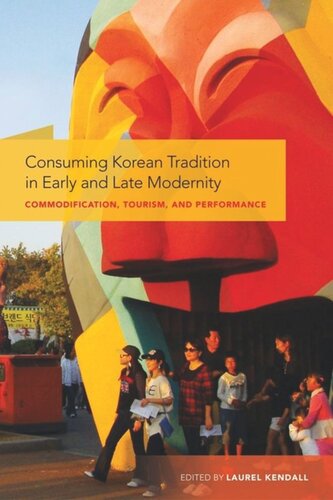

Most ebook files are in PDF format, so you can easily read them using various software such as Foxit Reader or directly on the Google Chrome browser.
Some ebook files are released by publishers in other formats such as .awz, .mobi, .epub, .fb2, etc. You may need to install specific software to read these formats on mobile/PC, such as Calibre.
Please read the tutorial at this link: https://ebookbell.com/faq
We offer FREE conversion to the popular formats you request; however, this may take some time. Therefore, right after payment, please email us, and we will try to provide the service as quickly as possible.
For some exceptional file formats or broken links (if any), please refrain from opening any disputes. Instead, email us first, and we will try to assist within a maximum of 6 hours.
EbookBell Team

4.8
104 reviewsContributors to this volume explore the irony of modern things made in the image of a traditional "us." They describe the multifaceted ways "tradition" is produced and consumed within the frame of contemporary Korean life and how these processes are enabled by different apparatuses of modernity that Koreans first encountered in the early twentieth century. Commoditized goods and services first appeared in the colonial period in such spectacular and spectacularly foreign forms as department stores, restaurants, exhibitions, and staged performances. Today, these same forms have become the media through which many Koreans consume "tradition" in multiple forms.
In the colonial period, commercial representations of Korea—tourist sites, postcard images, souvenir miniatures, and staged performances—were produced primarily for foreign consumption, often by non-Koreans. In late modernity, efficiencies of production, communication, and transportation combine with material wealth and new patterns of leisure activity and tourism to enable the localized consumption of Korean tradition in theme parks, at sites of alternative tourism, at cultural festivals and performances, as handicrafts, art, and cuisine, and in coffee table books, broadcast music, and works of popular folklore. Consuming Korean Tradition offers a unique insight into how and why different signifiers of "Korea" have come to be valued as tradition in the present tense, the distinctive histories and contemporary anxieties that undergird this process, and how Koreans today experience their sense of a common Korean past. It offers new insights into issues of national identity, heritage preservation, tourism, performance, the commodification of contemporary life, and the nature of "tradition" and "modernity" more generally.
Consuming Korean Tradition will prove invaluable to Koreanists and those interested in various aspects of contemporary Korean society, including anthropology, film/cultural studies, and contemporary history.
Contributors: Katarzyna J. Cwiertka, Kyung-Koo Han, Keith Howard, Hyung Il Pai, Laurel Kendall, Okpyo Moon, Robert Oppenheim, Timothy R. Tangherlini, Judy Van Zile.